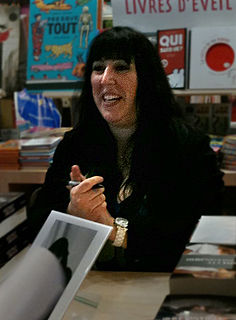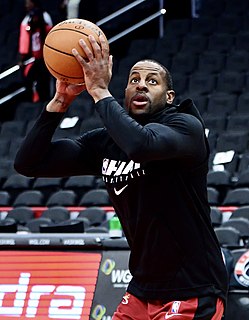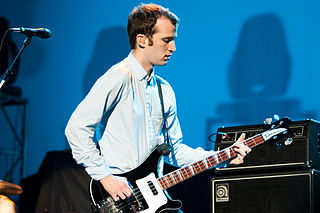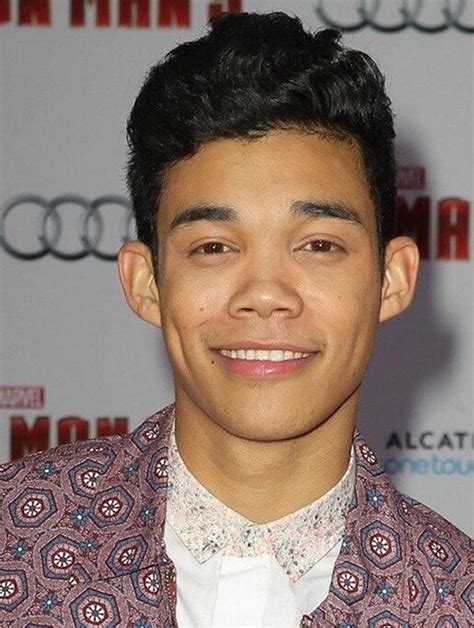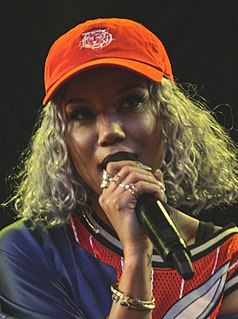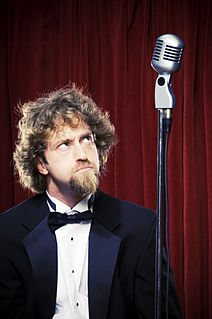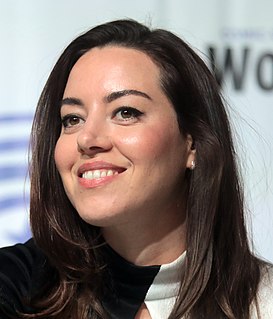A Quote by Kathleen Hanna
I'm really going off of watching John Waters speak one time and I remember he just kind of talked and it was totally interesting. I wanted to hear about his life and how he got started and when did he think he made it, stupid stuff like that. And what his relationship with the mainstream is because he's so far out there, but then he became part of the mainstream in this weird way. He was really funny, though. Yeah, I have to work on my jokes.
Quote Topics
Related Quotes
A garter. You’re supposed to take it off and keep it as a memento. K-k-kinda like a trophy for going far sexually with a girl. It’s stupid, really. And kind of d-d-degrading if I think about it too m-m-much.” “I know what it is,” he says, amusement evident in his voice. “I just wanted to hear your explanation.
I mean, when we did 'Families At War,' on Saturday night prime time, people said we were mainstream then. But it wasn't in the least mainstream. The fact that we got that on BBC1 at that time with those ridiculous things, that's as mainstream as we get. We do what we do and people can think that it's mainstream or avant-garde.
Before I even knew what stand up was, I tried to make people laugh at school because that was how I made friends, so I think that's how I got drawn into comedy and obviously I was just some kid at school being silly, so the first time I saw a professional comedian and how smooth and funny the person was I totally got into standup and I would say obviously Richard Pryor was the guy. He's the greatest of all time and then George Carlin, Sam Kinison, Bill Cosby. It's so weird to bring up his name now but leaving out his off-stage antics... you could learn a lot from him.
I guess in general, because it's such a popular trend in mainstream American pop, that there's been some kind of negative reaction to it. But at the same time, it's a really interesting effect and really interesting texture, and a lot of credit goes to Rostam for producing our music, and all the work that he puts into it, and just trying different things. Ezra did a vocal take, Rostam threw auto-tune on it, and we all liked the way it sounded.
And writing comedy and it really taught me how to kind of like craft jokes, it sounds like weird but really focus on crafting jokes and trying to make the writing really sharp. At the same time I did improv comedy in college, and that helped with understanding the performance aspect of comedy, you know, because it's different when you improv something vs. when you write it and they're both kind of part of my process now.
Yorgos Lanthimos said, "What about if he's a bit soft?" And I said, "Yeah, I think you're right." He just comfort-eats a little bit too much. He's just asleep in his own life and has let himself go. And the mustache, I don't know if it was him or I suggested it. But I remember my sister was watching me eat and she was like, "God, does he have to be fat?" And in retrospect I couldn't think of David being any other way because it affected the way I moved. It really did. It slowed me down in a way that I felt was conducive to kind of tapping into the spirit of the character.
I love dressing up. I like going out and buying some crazy stuff. I like stuff that's new, innovative and weird. I just pick out stuff that is unique and anything that I'm really diggin'. I don't really care if it's kind of out there. That's what I'm about. I like picking stuff that is really different.
I think I'm good with actors. I like directing actors. I also like to show up and just do an acting gig. Where I'm just a hired gun, I don't have to have an opinion on anything.I never got involved in all this stuff because I wanted to control stuff; I got involved in writing and producing because I wasn't getting interesting acting gigs. In a way I'm grateful that I didn't get interesting roles, because it made me pull my finger out and do some work.
I got off Twitter, because I started feeling like it was not adding anything positive into my life. If anything, it was more negative. But now I'm back on it because it can be fun. I think, as an actor and a public figure, it's a different experience when you put yourself out there in that way. I think it can be a great tool, and that part I'm comfortable with. But the part that's kind of more personal, that part I'm still struggling with, because I don't really want people to know everything about me.
I remember thinking as I was doing the jokes for the first time, "If I can hear that very clearly, I'm not hearing laughter." It just became deafening, this buzzing noise. I mean, it was brutal. It was really terrible. Then I remember thinking, "At least nobody important, or anyone who I really respect, saw that." And then literally right when I went off the stage, Jerry Seinfeld got up and went on. So I was like, "Oh great. Seinfeld saw me bomb." On the other hand, I thought, "At least no one will be thinking of me anymore. They'll just be focusing on him."
I really wanted to do a comedy. I've done a lot of drama, and comedy was the one genre I was not being offered. So I became obsessive about getting one. I tried with two little parts in comedies that were more mainstream, I was kind of fumbling around, and then I read The Brothers Bloom and knew it was the one I wanted to jump into. Did it take adjusting? Actually, it's not really any different from doing drama.

